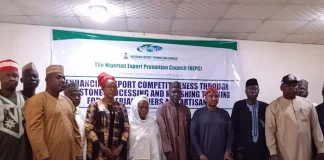The Nigeria Export-Import Bank (NEXIM) on Thursday facilitated the export of 7,000 metric tonnes of cocoa from a chartered ship via Calabar Port to the United States.
The NEXIM Managing Director, Abba Bello, while speaking at a ceremony to commemorate the event in Calabar on Thursday, said there was a need for more functional ports to facilitate the export and import of goods, ease the gridlock in Apapa and expand economic growth and development in other parts of the country.
He emphasized that the economic impact of Apapa gridlock had been severe as it often leads to the wastage of huge volumes of perishable agricultural products meant for export.
According to him, long delays in cargo movement have caused exporters to renege on contract agreements and have led to increased borrowing costs and other administrative expenses.
He said, “Apapa nightmare is partly a reflection of the increase in the volume of business activities in the Apapa and Tin Can Ports and associated high volume of human and vehicular traffic without corresponding improvement in the road network and other port infrastructure.
“The attendant challenges have had serious implications for the business climate contrary to the objective of the administration of President Muhammadu Buhari to ensure that Nigeria ranks among the top one hundred countries of the world on ease of doing business by 2023.”
READ ALSO: Mega Ship Disrupts One Of World’s Busiest Shipping Routes, Suez Cana
“This is even more so against the background of the expected increase in the volume of trade with the commencement of the Africa Free Trade Agreement (AFCFTA) and the ongoing efforts of the Federal Government to increasingly diversify the economy and promote non-oil exports,” he said.
The NEXIM MD said the bank was working with both private and public sector partners to develop and improve the maritime transportation system through the establishment of a regional shipping company, the Sea link Company Limited.
According to him, the company has been designed to bridge maritime infrastructure gaps to ease trade connectivity for coastal and hinterland trade to boost access for Nigerian manufactured exports within the regional market and solid minerals export.
“Having made significant progress, preparatory activities for the Sealink project have reached an advanced stage. The project has consummated a consortium partnership with some private sector maritime operators who have agreed to deploy about twenty vessels after issuance of ‘Notice of Readiness’ by Sealink project.
“As part of the indication of the project’s readiness, we have obtained approval for inland waterways right of way from the National Inland Waterways (Authority) as approved by the government,” he said.













